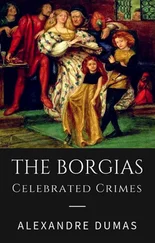Even before Gonsalvo di Córdoba had received these orders, Cesare, his confidence by now restored, had set about planning a march into the Romagna to regain what he had recently lost. When the royal instructions arrived from Spain, he believed that as a fellow Spaniard, Gonsalvo would be prepared to overlook them, and he started to raise troops for a campaign in Italy that he hoped would restore him to power. Gonsalvo, however, remained loyal to his masters.
The Florentine ambassador in Naples reported what happened next:
On 1 June [Cesare] asked for an interview with [Gonsalvo di Córdoba] to discuss his affairs. He had already prepared the artillery for his proposed campaign and had ordered wine, bread and other things necessary for his expedition. In the evening he had his interview with Gonsalvo… [who] was accompanied by Niugno del Campo, castellan of the Castel Nuovo in Naples, and when [Cesare] turned to descend the stairs, Niugno stopped him saying, ‘Signore, your way lies here,’ and led him into a room in the Torre dell’Oro… On Tuesday he was transferred to another room which was very beautiful but very strong with windows protected by iron bars. It is called ‘the oven’ and several important people have been held prisoner there at one time or another. He is there now with two servants. The Grand Captain refuses to talk to him. There is not a single man who does not praise this deed. In truth, it is pleasing to all.
Soon after this dispatch was received in Florence, Cesare was put onto a galley bound for Spain, where, so his sister heard, he was ‘shut up with a page’ in the castle of Chinchilla, high in the mountains behind Valencia.
Cesare’s fall had been as dramatic as his meteoric rise. Machiavelli blamed it on Cesare’s decision to support Julius II’s election, though it is difficult to see how he could have organized an alternative candidate to counter the front-runner and ensure enough support in the conclave to achieve the required two-thirds majority among the cardinals.
As Machiavelli commented in The Prince:
[Cesare] should never have allowed the election of one of those cardinals he had injured, or one who would have cause to fear him. Men do you harm either because they fear you or because they hate you… The Duke’s aim, first and foremost, should have been to engineer the election of one of the Spanish cardinals and, failing that, to enable it to be Rouen [Georges d’Amboise] not San Pietro in Vincoli [Giuliano dellaRovere].Whoever believes that great men allow new services to erase old injuries is deceiving himself. So the Duke’s choice was a mistaken one; and it was the cause of his ultimate downfall.
— CHAPTER 26 — Duchess of Ferrara
‘MY JOY IN SEEING YOU IS NEVER DONE’
THE DEATH OF HER FATHER, Alexander VI, followed so rapidly by the collapse of Cesare’s empire and his ambitions, and his humiliating imprisonment so far away in Spain, must have been devastating to the twenty-three-year-old Lucrezia. All the more so, isolated in Ferrara, where, according to the chronicler Bernardino Zambotti, it was widely believed that the pope had been poisoned; Cesare, too, ‘was found to have been poisoned,’ he reported, adding that ‘it was chiefly due to the fact that he was placed inside the still warm entrails of two mules that he was cured.’
The torrential rain that lashed Ferrara that September and October, causing the Po to burst its banks, flooding both fields and city streets, matched the depths of her misery. Couriers arrived daily with news of Cesare’s cities and fortresses as they fell, one by one, some returning to their earlier rulers, others seized by Venice; of the new tenant of her old home, the Vatican Palace, and how the new pope had shut up her father’s apartments, where she had once danced and laughed so gaily, and vilified ‘that Spaniard of accursed memory.’
It was not just her private grief at the loss of her father and brother that overwhelmed her; it was clear from the gossip at court that Lucrezia’s position as wife of the heir to the duchy was now also under threat. One friend advised her to do all she could to assuage her grief lest people thought she was overcome by apprehension about her own future.
Louis XII himself was ready to repudiate both Cesare and Lucrezia now that Alexander VI was dead; and he told the Ferrarese envoy that he knew very well that the Este family had never been pleased with the Borgia alliance, and ‘therefore the French court did not regard Madonna Lucrezia as Don Alfonso’s real wife.’ Alfonso, however, had become attached to Lucrezia. Hearing of her father’s death, he came home to Ferrara to comfort his wife and thus to show that although the marriage had lost its political raison d’être, it still retained its private lustre.
They seemed to have been ‘quite satisfied with one another,’ and they may well have been so, but their temperaments were very different; while he still continued to spend a large part of each day in the lecture halls of the university or in his workshop, poring over proposals for public works, military engineering, and firearms, she enjoyed the life at court, where masques and tableaux, drama and poetry occupied the evening hours.
Music was the interest closest to Lucrezia’s heart, and one she shared with her husband, who was himself an accomplished player of the viol. She employed her own singers, pipers, and lute players, even her own dancing master, spending a large part of her income on the patronage of music. She was particularly fond of songs, of the lovely Spanish poems that were set to music by her musicians; and she vied with her rival, Isabella d’Este, to attract the best players and composers to her court.
The court at Ferrara was famous throughout Italy as a centre of culture. Duke Ercole had doubled the size of the city and transformed it into a setting worthy of ducal grandeur, enclosing a huge hunting park, complete with its own racecourse, where ladies of the court could watch their knights displaying their skills, jousting at the ring or pursuing game with trained leopards; he added new gardens and gilded reception rooms to the ducal palace and, in 1504, decided to build on the grounds the Sala delle Comedie, the first purpose-built theatre since antiquity.
Among the many foreign writers and musicians attracted to this lively cultural centre were the scholarly humanists Ercole Strozzi and Pietro Bembo. A member of the Florentine family whose grand palazzo, built for Filippo Strozzi, is one of the most imposing in Florence, Ercole Strozzi was a poet of distinction. Much disliked by Lucrezia’s husband but admired and sponsored by her father-in-law, Strozzi was a distinctive figure in Ferrara, where he hobbled about on crutches that his clubfeet rendered indispensable.
Strozzi was clearly and immediately attracted to Lucrezia, as she was to him. He sympathised with her in her differences with her father-in-law, who kept her, so she complained, so short of money that she was not able to dress with the distinction that was her due. Strozzi made light of her complaints; she could always borrow money; and since he himself was shortly to go to Venice, he would buy for her there such materials as those for which that city was celebrated. He returned with large bundles to the delight not only of Lucrezia but also of her ladies, who were presented with rolls of material to be made up into dresses of exceptional splendour.
Pietro Bembo, on the other hand, was a Venetian poet, handsome and charming, a man in his early thirties whose company Lucrezia found especially alluring. Indeed, there were whispers at court that the duke’s new daughter-in-law might have succumbed to Bembo’s charms; it was generally supposed that they soon became lovers. Certainly she was always ready to enjoy the company of the lively brilliant poet when he was in Ferrara or a guest at Ercole Strozzi’s lovely villa at Ostellato, on the shores of the lagoon at Comacchio, travelling there from time to time along the waters of the Po in her painted barge.
Читать дальше











